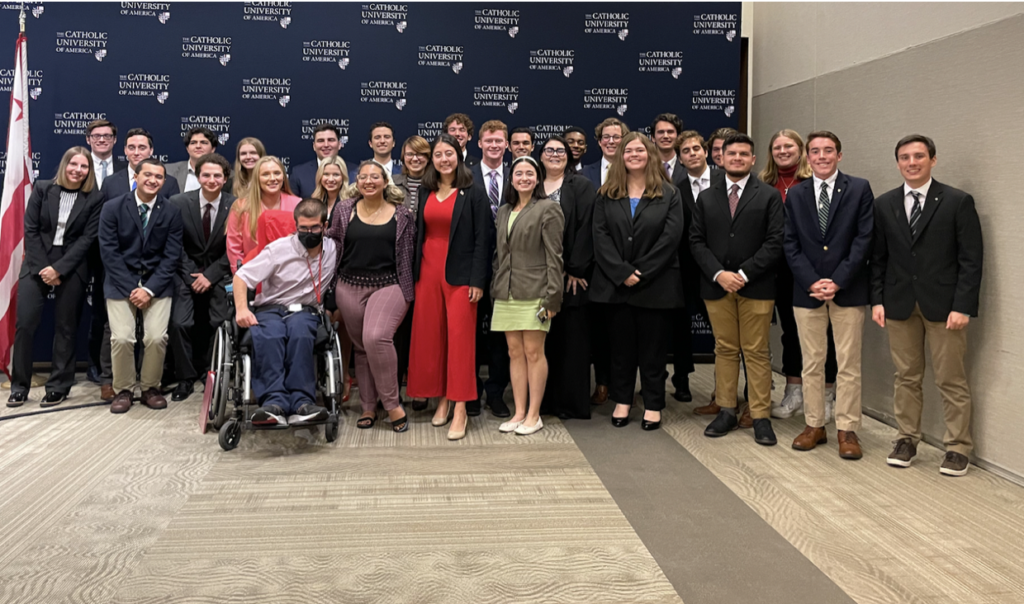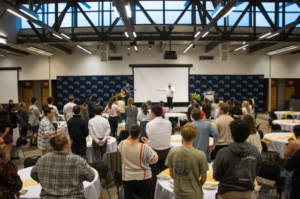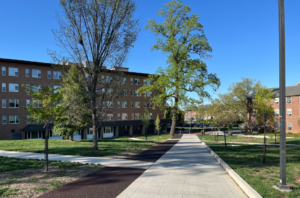New Senators Take a Stand: A Night of Resolutions By First-Year Senators

Image Courtesy of The Catholic University of America
By Chanel Cole
On March 23, 2023, VP Fahey initiated the senate’s second to last meeting of the school year. Roll call happened as usual and all the senators but two were in attendance.
Following the Pledge of Allegiance and prayer, public comment commenced, starting with Director of the DSS Initiative, Correy Crawford. He spoke to the success of the campus shuttle pilot program, stating that the shuttle took 411 trips while the program was in phase. Crawford also announced that he is working with Senator Gehrig to expand the shuttle program through a resolution for the next meeting.
Next, Reagan Budasi, a freshman social work major, rose in support for Resolution 034, advocating for the recognition of American Sign Language as a foreign language.
Subsequently, President Tony Crnkovich expressed his gratitude to Correy Crawford for his work in DSS, reminded everyone to vote in the upcoming SGA executive elections and thanked the senate speaker, Mr. McLean for coming that night. This was followed by Crawford rising again in support of Resolution 036, regarding reform to the DSS testing accommodations process.
And with that, public comment came to a close and the senate suspended the rules to welcome the senate speaker of the night Major Kirk McLean. Accepting the position as head of DPS in June 2020, Major McLean spoke about his many years of experience in the police office in Prince George’s County and how he’s been able to integrate those skills and knowledge in his current position. After he gave a brief background about himself, he opened the floor to questions.
Senator Besendorfer went first and asked him about his favorite part about working at the university. Major McLean stated that it was using his experience to make the campus better and the interactions he engages in with other members of the community. He also acknowledged the work that the current senate has done to better DPS, including the adoption of a DPS Appreciation and the DPS Feedback Form.
Senator Curioso then asked how one could access the feedback form and Major McLean explained how to find it on DPS’s website. Moreover, Senator Bommer asked the speaker to talk about the relationship between DPS and the DC Metropolitan police. McLean responded, explaining that the relationship is strong, and as a result it’s rather easy for him to get more information about crimes outside of DPS’s jurisdiction and distribute useful information to the campus community.
Upon the conclusion of that explanation, Senator Kish then asked McLean if he could elucidate some ways that students could promote a relationship with DPS officers.Major McLean thanked Kish for his question and admitted that he had been devising plans for more student engagement with DPS. He explained that DPS already holds monthly talks online, but he also planned to have officers hold some tabling in the Pryz as well.
After Kish’s question was answered, Senator Kruger wanted to know if there were any other resources for students to stay safe. To respond to this, Major McLean stated how Rave Guardian is an undervalued resource that is rarely used and described some of its features.
Following this, Senator Gehrig asked about the process of how information about crimes are disseminated to the campus community via email. Major McLean started off his reply by stating that DPS is required to send information to the entire university when crimes happen in the vicinity of campus. This helps make students aware of what’s going on. He informed that while his predecessor was in charge, notices of crimes were issued with a considerable delay to the point where the information was useless. Now, McLean pushes for the notices to be released promptly and as detailed as they can possibly be.
Senator Bubel then asked if McLean had any plans on improving pedestrian safety against vehicular collisions to which he responded that historically, vehicular accidents involving pedestrians have not been an issue, but expressed a willingness to work on the issue with SGA.
The last question for the speaker was asked by Senator Suarez, pertaining to DPS’s plans for growth in the future. He answered that he will continue to stress professionalism and training and mentioned getting newer technology and vehicles so that the officers are more readily equipped to help. After a few closing remarks, the presentation came to an end and McLean was dismissed with a round of applause.
The committee chairs Senators Besendorfer, Gehrig, Michels and Drauschak then shared with the senate all the resolutions that were being worked through in their respective committees. This was followed by VP Fahey asking for a round of applause in acknowledgement of the fact that all resolutions of the night were sponsored by first-year senators.
The first resolution of the night was then introduced, Resolution 033, with a goal to expand student awareness of tech services. Sponsored by Senator Corey of the School of Theology and co-sponsored by Senators Djilioni, Ewing, Suarez they want to accomplish the resolution’s goal by asking residence life staff to remind students of the tech services available to them by placing posters behind the doors of residence hall dorms. Senator Corey stated that while postered are already in residence hall buildings, they were not enough. He explained that his inspiration for the resolution came from a meeting with tech services regarding another idea he had for a resolution. It was through that meeting that he realized how little awareness the general student population had about the services that the Tech department provides at CUA.
Finishing his introduction to the resolution, Senator Besendorfer rose in support, speaking to her own experience of using untapped resources that tech services provide. This was followed by Senator Musick, who had doubts regarding the utility of the demands of the resolution, stating that as RAs, herself and Senator Gehrig already sent out emails with information about tech services at the beginning of the year. She was uncertain that an email from Residence Life administrators would have much of an effect. In response, Senator Corey thanked her for her work as an RA, but asserted that Residence Life felt that more would have to be done on the matter.
Afterwards, Senator Bommer was curious about the impact that the resolution would have on students that live off-campus. The sponsor responded by acknowledging that the resolution would have no direct impact on students that live outside of campus, but expressed hopes of information about technology services spreading through word-of-mouth. Senators Ewing and McCarthy praised the resolution and added on several points in support. Finally, Senator Kish asked some logistical questions regarding the size of the proposed posters and whether or not they would be fridge magnets. Senator Corey suggested leaving those granular details to advocacy, citing a template that the Advocacy Sector could choose to use in guiding their decision.
With that, the senate was ready to take a vote on the resolution. With 22 in favor, 1 against, and 1 absent, the resolution passed.
The second resolution on the docket, Resolution 034, sought to recognize ASL as a foreign language. Its sponsor was Senator McCarthy, a representative of Social Work majors. Co-sponsors of the resolution were Senators Ewing, Foley, Martin and Noory.
To introduce his resolution, Senator McCarthy shared an anecdote of how his Social Work professor told him of the opportunity to learn American Sign Language (ASL). It was later that he found out that only social work majors can fulfill the liberal arts language requirement by taking ASL classes at Gallaudet University. Regarding the fact that it is the third most common language in the US and that many prestigious universities already recognize it as a foreign language, he asserted that CUA should as well. McCarthy added that nursing majors want to learn it, as it would be a useful tool for providing medical assistance to the deaf community. Co-sponsors Senators Ewing, Martin and Noory all provided additional reasoning to support the resolution.
Senator Corey gave his support to the resolution and asserted that if Latin, a language hardly spoken today, can fulfill the language requirement, then by justification, ASL should as well. The sponsor agreed with that sentiment. Senator Gehrig also agreed as someone that used Latin to complete the language requirement and asked what the timeline on implementing the resolution would be to which Senator McCarthy responded that he was unsure. Furthermore, Senator Zayas also rose in support of the resolution and thanked McCarthy for his hard work on it. Additionally, Senator Besendorfer praised the resolution by sharing her personal experience and expressed a desire to learn the language herself if it would have fulfilled the language requirement. Subsequently, Senator Bommer asked about the end goal of the resolution and whether or not it involved hiring a tenured ASL professor at CUA. Senator McCarthy remarked that the University is currently facing a hiring freeze and all that he is asking with the
resolution is to allow ASL to fulfill the language requirement for all majors. Discussion concerning the resolution was concluded by Senator Curioso praising it.
A motion to vote was then made and the resolution passed with all in favor.
This was followed by the next resolution of the night, Resolution 035, sponsored by Senator Curioso and co-sponsored by Senator Suarez. It sought to improve access to confession on campus. Senator Curioso explained that confession usually occurs before mass or during adoration. In St. Vincent’s Chapel, there’s one room of a closet, which is not wheelchair accessible. He stated that he had to make his confessions outside, which is an encroachment on the seal of privacy sacred to confession. Curioso reported that the lines are so long, that sometimes, those waiting at the end of the line are denied confession. Through Resolution 035, he hopes to reduce confession lines at St. Vincent’s Chapel by spreading more awareness about the Basilica’s hours of confessions and having Campus Ministry’s website updated with the appropriate confession times. Regarding who he spoke to on the matter, the sponsor stated that he had asked President Crnkovich and he told the senator that it would be unnecessary to hold a meeting with Father Aquinas, the Director of Campus Ministry. Furthermore, on speaking to VP Fahey, Senator Curioso found out that the University was in the process of sound-proofing Maloney chapel.
The resolution then hit the floor for debate. Senators D’Atelo and Campbell both praised the resolution and shared their personal experience that guided their support.
Senator Bommer then thanked the sponsor for the resolution but also expressed some concerns. He stated that Campus Ministry (CM) already offers confessions and that all one had to do was set up an appointment to see a priest. Additionally, Bommer stated that there were already QR codes available with the correct times that the Basilica offers confessions. Therefore, he did not understand the need for the demands of the resolution. Co-sponsor Senator Suarez chimed in, stating that the confessions within CM that Bommer was referring to were inconvenient for the already busy priests and were not as reliable as confessions with set times. The resolution’s sponsor added that as a Rome School student, his schedule is busy and that for him, setting up an appointment would be unfeasible. Similar to his co-representative, Senator Drasuchak also had some concerns and asked how much time a week CM would dedicate to confessions, to which Senator Curioso responded that the hours should be left to Campus Ministry’s discretion. This was followed by Senator Bubel voicing concerns similar to Drauschak and Bommer’s concerns. Curioso provided a similar response, stating that the hours should be left to advocacy. Senators Foley, Martin and Besendorfer ended the debate by doling out their support for the resolution.
A roll call vote occurred and the resolution passed with 21 in favor and 3 against.
The final resolution of the night, Resolution 036, sought to reform DSS testing accommodation requirements. Sponsored by Senator Gehrig and co-sponsored by Senators Curioso, Downing, Zayas, and Kruger, the resolution wanted to lower the requirement of notify DSS for testing accommodations from 7 business days to 5 business days. Introducing her resolution, Senator Gehrig shared personal testimony of how she suffered from a concussion days before midterms last year and had to experience the process of requesting testing accommodations through DSS. With the resolution, she hoped to alleviate some stress off students in unforeseen circumstances where accommodations would be necessary. Moreover, she explained the process of requesting accommodations and pointed out all the things that could go wrong in that process that are beyond the student’s control. Gehrig admitted that originally her plan was to lower the requirement to three business days, but through talking to the VPSAC, realized that five business days was more feasible. Co-sponsor Senator Curioso also shared some personal testimony on his experience with DSS.
First, Senator Besendorfer verbalized her support for the resolution and shared testimony of using DSS in the past, stating that testing dates were unreliable as professors are sometimes inconsistent with the dates in their syllabi. Afterwards, Senator Suarez wanted to know more about how DSS accommodations were requested. The sponsor explained that there were two types of accommodations: long-term ones that are usually requested at the beginning of freshman year and short-term ones that are requested under unforeseen circumstances such as a sports injury. For short-term accommodations, those who need it must fill out the DSS form for each individual instance.
Senators Kish, Ewing, and Tamayo provided further justification for supporting the resolution and following this, a vote was taken and the final resolution of the night passed unanimously.
In her VP updates, Fahey thanked all the senators for their resolutions and the debates surrounding them. Afterwards, she opened the floor for final closing remarks.
Senator Ewing informed the senate that the interfaith space at the request of Senator Henriquez resolution is now open in Pangborn Hall, Room 310. Senators Drauschak and Curioso had remarks on past resolutions and future events. Senators Gehrig and Martin gave updates on their pilot programs they’ve been working on. Finally, Senators D’Atelo and Kish informed the senate of their work on upcoming resolutions and with that, the meeting concluded.







